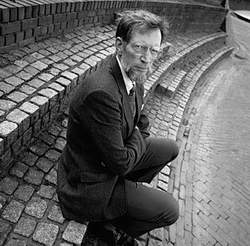By the way, in reading the following don't get too nonplussed by her comments about meeting those of "other religions" with kindness and acceptance. Remember she says "as much as one can", and realize that the rest of her article makes it pretty clear that she believes salvation can be found nowhere else but in Christ alone. The balance of honoring what's true and correcting all that errs in the worldview of others follows Paul's own pattern in addressing the Gentiles (Acts 17:22-34).

Our context is no more pluralistic than was the context of Paul or of any of the apostles who lived, worked, and taught in the Roman empire of the first century of this era. Although people are fond of saying so, we do not live in unprecedented times. The world of the early church knew of the claims that there were indeed “many lords and many gods.” There were claims for the gods of nationalism and power, such as the Ceasars and Rome; for the various gods of foreign and mystery cults, such as Isis and Osiris; local and civic deities, such as Athena, Artemis, and Apollo; the gods of chance and fate, such as fortune, fate, and luck; and the generic life force of the universe. Precisely in the context of such claims, Paul affirmed that there is “one God, the Father, and one Lord, Jesus Christ.” Our world, too, knows of “many lords and many gods” – and many of them take the same form as they did in Paul’s own day – nationalism, foreign deities, fate and fortune, and the pantheistic belief that all is God. In the ancient world, Christianity provided an alternative to the shapeless confusion of antiquity; in the modern world, it can provide the same alternative, but only if it articulates the gospel clearly.
In such a world, it is urgent that the Church have the courage to speak its belief in the one Lord, for this is the content of the Gospel. In making this proclamation, it must be clear that it does not seek to add another deity to the pluralistic mix, but that it intends to bear witness to the Lord who is “above every name,” for he is the one whom God has “set above all rule and authority, all power and dominion.” In other words, the foundation of the church’s confession and proclamation who Jesus is, through God’s mercy and grace, for all the world and also for us. The confession that Jesus is “my personal Lord” is not the same as the confession “he is Lord.” And unless we truly believe that he is Lord, we ought not to make the confession he is “my Lord,” because to do so is tantamount to idolatry, honoring one lord among many lords.
As one author put it, “To assert today that the one Creator God has revealed himself fully and finally in Jesus Christ is to risk criticism on the grounds of arrogance or intolerance. The mission of the church, however, does not commit Christians to the proposition that there is no truth to be found in other religions. All philosophies or religions which have some ‘fit’ with the created world will thereby reflect in some ways the truth of God. [This] does not, however, imply that they are therefore, as they stand, doorways into the new creation. That place … is Christ’s alone” (N. T. Wright, Colossians and Philemon [Leicester: Inter-Varsity; Grand Rapids: Eerdmans, 1986], p 79).
If the church compromises its witness to the Lordship of Christ, then it has ceased to be the church of Jesus Christ. But in proclaiming and living this news as good news, we must be certain that our mode of confession matches the trajectory of the self-giving and self-emptying of the crucified one who loved us and gave himself for us. So question 52 of the Study Catechism asks, “How should I treat non-Christians and people of other religions?” Answer: As much as I can, I should meet friendship with friendship, hostility with kindness, generosity with gratitude, persecution with forbearance, truth with agreement, and error with truth. I should express my faith with humility and devotion as the occasion requires, whether silently or openly, boldly or meekly, by word or by deed. I should avoid compromising the truth on the one hand and being narrow-minded on the other. In short, I should always welcome and accept these others in a way that honors and reflects the Lord’s welcome and acceptance of me.”
If this is what the catechism asks of us in relationship to people of other religions, how much more should we deal with friendship, kindness, generosity, and forbearance with our sisters and brothers in Christ. In other words, the virtue we must seek to cultivate is not the American virtue of tolerance, but the biblical virtue of humility. Humility is not the same as tolerance, for humility recognizes that a word of judgment may always be addressed to us, and that there are logs in our own eyes which we need to remove. Humility is the stance that we, as those who are united in baptism to the death and resurrection of our Lord, must seek. We have a long ways to go before we show the kind of compassionate and courageous love which Jesus demonstrated to the tax collectors and sinners as he welcomed them to his table. We forget the scandalous character of his act, as we forget the shameful character of his death on the cross, which he endured for us while we were yet sinners . There will be a profound irony and, indeed, shame if those of us who insist most vociferously that “Jesus is Lord” are also known to be characterized by a lack of humility and love.
But as the catechism states we must also “meet error with truth.” There is no formula — nor has there ever been — a formula for how one measures and mixes truth and forbearance. Paul’s unflagging commitment and unfailing compassion can remind us that we can never compromise on our zeal for truth —or for forbearance. This is neither an easy road to walk nor an easy witness to bear. But let us also be reminded that where the church fails to hold fast to its commitment to Christ as Lord, and therefore to hold and speak this truth in the humility of Christ himself, the loss is not only ours, or the church’s, but also the world’s.

 These claims impact biblical intepretation and theologizing because they reverse the priority of explanation in doing theology: instead of appealing to abstract "attributes of God", soteriological concepts, etc. and then using individual accounts in Scripture as illustrations of these definitions, narrative theology commends particular stories about God as our primary definitions with the propositional content being the commentary. Our doctrine of redemption isn't an abstract category in which "God's purchasing sinners by the death and resurrection of Christ" is one instance - we only know what redemption is because of Christ's death and resurrection! God isn't omnipotent with specific instances of God acting powerfully in the Bible - those instances define what we mean by omnipotent (a definition which includes powerfully conquering sin through weakness on the cross). In this way postmodernism's critique of "Enlightenment rationalism", which claims to operate without cultural factors and biased accounts of the world (like stories), happens to share presuppositionalist critiques against evidentialism and Christianity's critiques of secular science.
These claims impact biblical intepretation and theologizing because they reverse the priority of explanation in doing theology: instead of appealing to abstract "attributes of God", soteriological concepts, etc. and then using individual accounts in Scripture as illustrations of these definitions, narrative theology commends particular stories about God as our primary definitions with the propositional content being the commentary. Our doctrine of redemption isn't an abstract category in which "God's purchasing sinners by the death and resurrection of Christ" is one instance - we only know what redemption is because of Christ's death and resurrection! God isn't omnipotent with specific instances of God acting powerfully in the Bible - those instances define what we mean by omnipotent (a definition which includes powerfully conquering sin through weakness on the cross). In this way postmodernism's critique of "Enlightenment rationalism", which claims to operate without cultural factors and biased accounts of the world (like stories), happens to share presuppositionalist critiques against evidentialism and Christianity's critiques of secular science.











